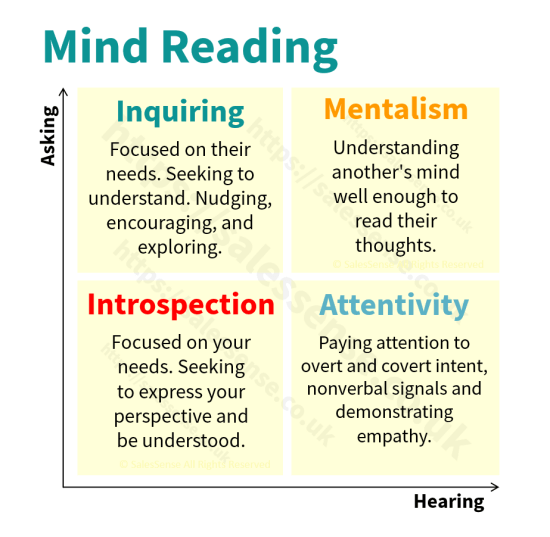Improve interpersonal communication skills by reading people. Learn to understand the outward signs and nonverbal language that reveal another's thoughts.

Do you need to improve interpersonal communication skills for yourself or a team? Take a shortcut. Schedule a call and tell me what you are looking for. I'll share what I know. Reach out today for a special offer on our interpersonal communication skills training course.
How do I start mind reading?
Mind reading is a skill, not a psychic ability. You can learn to read people from situational clues, body language, and voice expression.
The ability to read people's unspoken messages increases understanding and improves interpersonal communication.
Improve your sensitivity to nonverbal communication, learn cold reading, and enhance your listening skills with the following ideas.
Practise with any or all of the following techniques to develop or improve the ability to read people's minds:
- Set aside all your plans. Whatever outcome you hope for from the conversation or meeting, let it go. The more you desire to steer, the less you will be present.
- Banish your thoughts. It is only by suspending your thinking that you can create a silence from which to hear.
- Create an expectant state of mind. Recall the last time you were excited about exploring something or somewhere new. Capture the feeling and let the memory go. Hold only the feeling.
- Instruct your mind to remain quiet. No matter how great the discovery, insights and revelations must be saved and recalled later.
- Refuse to allow comparisons with your personal experience. Suspend comparisons until later and never interject to tell your story no matter how relevant it is.
- Set aside your opinions, beliefs, and principles. You must not judge anything the other person is saying or communicating. You will be free to assess what you have recorded in your memory after the conversation is concluded.
- Listen with your eyes. Observe every flicker of expression, every set of posture and stance, every nuance of movement. Allow yourself to observe without judgment.
- Listen with your ears. Hear beyond the words. Listen for the emotion and intent that gave the words air.
- Listen with your nose. Don't laugh, this is a serious point. Odours may be beneath conscious awareness. Not so long ago, people were much more dependent on their sense of smell. Open your mind to the opportunity of learning from your olfactory senses.
- Feel what the other person feels. Suspend your own feelings and tune into theirs. Let go of or compartmentalise your sense of self so that you can feel the other person's feelings, communicated by the subtle unspoken language you are observing.
- Subvocalise what the other person is saying. Literally, speak their words in your mind. Silently mimic their voice with as much accuracy as you can manage.
- Keep your patience and concentration. At first, you may find that you can only do this for a moment or two before your own mind sabotages your efforts by demanding that you pay attention to your own thoughts and feelings. Persevere and you will find that you can gradually increase your span of presence.
- Relinquish all urgency to remember. You have no need to fear forgetfulness for if you are truly present, you cannot miss anything. Forgetfulness is a symptom of distraction. You have a perfect memory of what you dwell on.
- Trust in your innate ability. Everyone has a talent for mind reading. The task is to suspend our own internal chatter so that we can disentangle the signals of another's mind from those of our own.
- Set aside time for a deliberate review. Make an appointment with yourself when you will escape distractions and consider what you have learnt from each moment of presence.
Adapting these suggestions and practising the habits described, improves the ability to recognise the thoughts of the people you interact with.
Those who develop these skills become better communicators, have more influence, and are more easily able to persuade. Improving interpersonal communication skills decreases mistakes and miscommunication, increases efficiency, and improves morale.
Article by Clive Miller
What help is available for learning mind reading or improving interpersonal communication skills?
Having a coach accelerates learning for almost everyone. A coach will help you create a development plan, design exercises for practise, act as an exercise partner, and provide some motivation through expectation. We offer a coaching service.
Numerous interpersonal communication skills training courses are available at all levels of affordability. Many books and articles address the subject. Since communication skills are fundamental for salespeople, almost everything we do is connected with improving interpersonal communication.
Related Links
Communication skills articles - see the list.
Business communication skills training - details.
Get Anyone to Do Anything - book review.
Tricks of the Mind - book review.
Persuasive Communication - Part 8a of our free B2B sales training.
Persuasive Communication - Part 8b of our free B2B sales training.
Miscommunication - guest article
Rider on a Wild Horse - article.
If you need to improve interpersonal communication skills, listening skills, or sales communication skills, we can help. Telephone +44 (0)118 983 3887. We will be pleased to learn about your needs and discuss some options. Alternatively, mail custserv@salessense.co.uk or use the contact form here.












